A still from Jasmin Baumgartner’s “Bye Bye, Bowser,” which screened as part of Short Film Program 3 at the 2024 Sundance Film Festival.
By Lucy Spicer
One of the most exciting things about the Sundance Film Festival is having a front-row seat for the bright future of independent filmmaking. While we can learn a lot about the filmmakers from the 2024 Sundance Film Festival through the art that these storytellers share with us, there’s always more we can learn about them as people. This year, we decided to get to the bottom of those artistic wells with our ongoing series: Give Me the Backstory!
Sundance Institute’s commitment to uplifting filmmakers from underrepresented communities is reflected in the projects that screened at the 2024 Sundance Film Festival — including the Short Film Program. As we continue to spotlight women creators to commemorate Women’s History Month, we’re revisiting the 2024 Festival shorts — 52% of which were directed by women — and learning about some of the women filmmakers from the lineup. (Check out our post about Black filmmakers in the 2024 Festival Short Film Program here, and be on the lookout for backstory blogs on AAPI filmmakers, LGBTQ+ filmmakers, and more in the coming months!)
Below, discover how these unique artists approach filmmaking, as well as what inspired their 2024 Festival shorts, which include a Viennese punk rock love story, an experimental commentary on climate collapse, an animated touch-starved dystopia, a darkly comic reckoning for a liar, an ode to strength on the road to recovery, and a tale about a voice-focused dating app.
Read on to learn more about eight of the 29 women filmmakers who brought their creative storytelling to the 2024 Sundance Film Festival Short Film Program.
What was the biggest inspiration behind the film?
Jasmin Baumgartner (Bye Bye, Bowser): “After a long trip abroad, I finally got home. And the next day, I found myself partying with friends, watching them treating each other like shit. Every second another heart breaks without being noticed. Later that night, I talked to a Viennese artist in the middle of drama. I asked him why no one in this city would care at all. He answered that it’s kind of a privilege to be able to come back the next day and nothing ever changes. The feeling of all your friends being self-involved artists combined with the deep longing for true connections — that’s what Bye Bye, Bowser is about. I also love punk rock and really wanted to work with Luna Jordan.”
Kelly Sears (The Lost Season): “My films are where I channel anxieties and frustrations about how narratives of power and projects of progress unfold. In The Lost Season, the fix for this soon-to-be lost season is ridiculous but also probable as we imagine the commodification of future climate collapse events.”
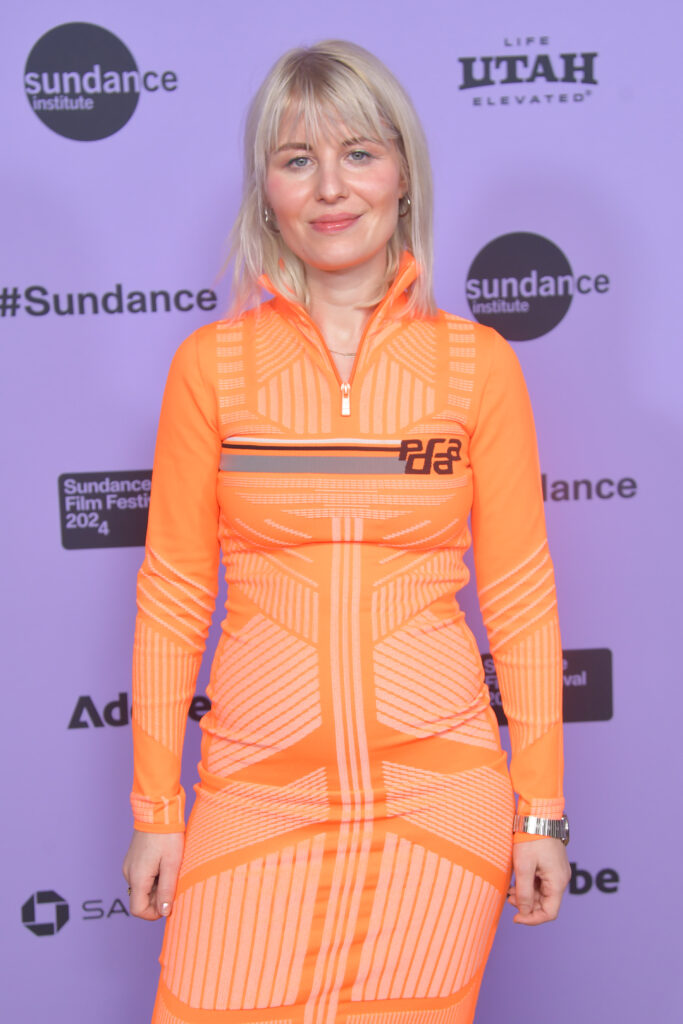
Filmmaker Jasmin Baumgartner attends the January 20 premiere of Short Film Program 3 at the Egyptian Theatre in Park City, Utah. (Photo by Stephen Lovekin/Shutterstock for Sundance Film Festival)
Bianca Caderas (Matta and Matto): “Absence of touch and what it did to me psychologically — that was my biggest incentive for the story.”
Kerstin Zemp (Matta and Matto): “The unthinkable thing happening, where friendly human physical interaction was seen as something bad and sickening.”
Alison Rich (Pathological): “I read a New York Times article about a guy who had ruined his life with his compulsive lying. Two things came through for me in that article. 1. A pathological liar often lies from a place of profound inadequacy. They feel like the real them isn’t enough to get the genuine human connections they want, which I found extremely relatable. 2. The lies pathological liars tell are really wild and fun, and I figured it’d be a delight to bring them to life.”
Vaggelio Soumeli (Phoebe): “All people fighting with addiction who don’t give up hope. The Phoebes of this world. The ones I met, but also those I never met.”
Pauline Archange and Céline Perreard (Voice Ever): “The idea for Voice Ever came to us as a result of the vortex of new virtual interactions in which we are transported: social networks, dating apps, connected speakers, etc. Talking to a number of friends, we realized that it’s more and more complicated to get to know each other in the street, in a bar, at a friend’s house. For most of them, dating on an app is the only way to get in touch.
What we’d like to express through this film is the difficulty of meeting each other in real life and, above all, the difficulty of meeting in the virtual world. The zapping of thousands of portraits on the dozens of applications installed on our phones makes our heads spin. You end up finding nothing interesting in anyone. After looking at a number of dating apps, we came up with the idea of creating a dating app based on peoples’ voices. A dating app that breaks the mold of physical appearance. This principle allows us to take a different approach to the other person. What words to use, with what intonation? What does the voice say about us?”
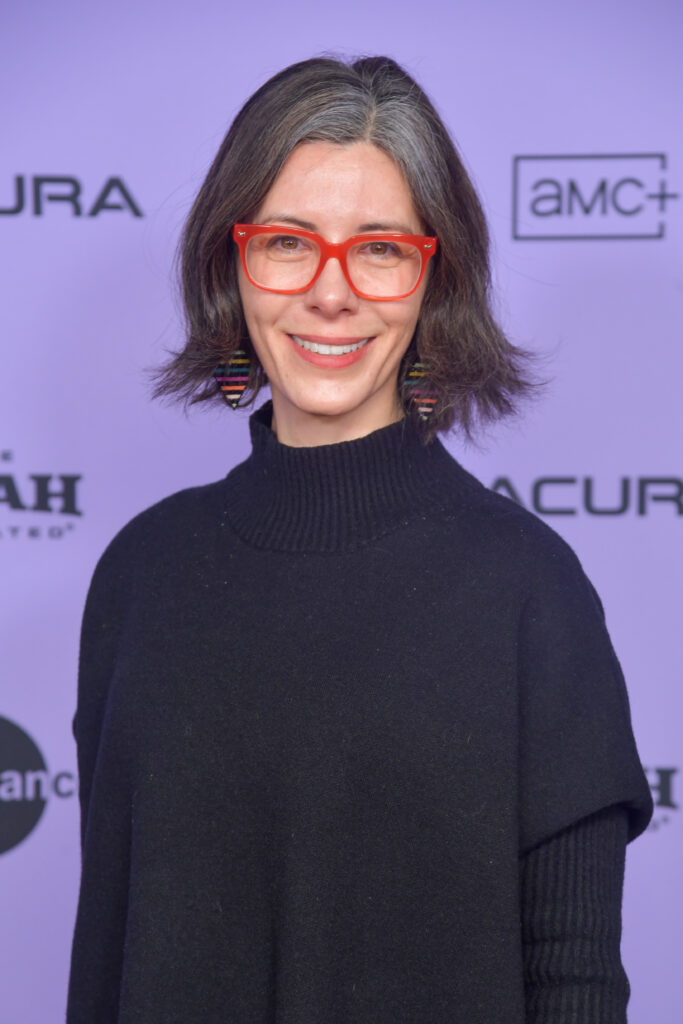
Writer-director Kelly Sears attends the January 20 premiere of Short Film Program 2 at the Egyptian Theatre in Park City, Utah. (Photo by Stephen Lovekin/Shutterstock for Sundance Film Festival)
Describe who you want this film to reach.
Sears: “Anyone who experiences weather. Audiences with climate anxiety. Viewers who feel alienated by screen, immersive, or virtual promises.”
Zemp: “Everybody who loves the absurd.”
Archange and Perreard: “Communication problems can affect all generations, can’t they?”
Why does this story need to be told now?
Sears: “In 2023, we witnessed historic weather, killer heat, monster wildfires, and more extreme storms. We also witnessed labor disputes around Hollywood and studio productions concerning growing wage disparities and worsening job security. These grievances are shared by many other industries that also went on strike that year. While these may seem like separate stories, there’s an overlap between how natural disasters and labor are exploited for profit.”
Caderas: “For me, it’s a kind of reminder of how important the small interactions in life with other people can be. Not just in terms of touch, but also simply interpersonal encounters and how important they can be. For example, how much it can give you when a stranger says something nice to you, sometimes that stays with me and makes me happy the whole day. Maybe a reminder that we as a society don’t have to go through life alone and that it’s important to cultivate our relationships.”
Zemp: “We as humans have started to lose touch with each other and reality, especially when in 2020 the lack of physical touch pushed a lot of people into very sad places.”
Rich: “I think we’re living in a time where people feel increasingly inadequate because of social media and isolated because of how the pandemic changed our daily lives. And I just want to remind people that, as corny as it sounds, they’re enough.”
Tell us an anecdote about casting or working with your actor(s).
Sears: “When I saw my mom say her lines and moves, I was mesmerized. We trained many times, but on the scene, it was real in the deepest state. I can’t say what that feeling was, but that was fantastic.”
Rich: “My co-star Meaghan Rath was seven months pregnant during filming, but I was so sure she was the best person to play the role, so we just worked around it by doing all the classic pregnancy hiding moves (big clothes, big bags), and I’m happy to say I think it really worked!”
Soumeli: “It was during casting time — I had seen at least 15 actresses, all amazing and very talented, but none of them was Phoebe. One night, I was out drinking raki with my friend Athina. I have known her since she was born, and we are very close. I was looking at her straight in the eyes, and suddenly it hit me. I said, ‘Athina, I think you are Phoebe. Please let me cast you.’ She laughed and said, ‘What the fuck, let’s do this.’ And we did it. Then we started rehearsing. It was not easy, but we had funny and happy moments, too. I have great respect for professional actors, but sometimes you need to think out of the box.”
Films are lasting artistic legacies; what do you want yours to say?
Baumgartner: “I don’t want people to feel that they are just being taken for a ride. They should feel included in a personal secret.”
Sears: “As much as I dig into doom in my films, I hope they encourage us to imagine new possibilities and dream new futures.”
Caderas: “We want to create a world that is coherent in itself, that has its own rules: ultra weird but still normal for everyone. That’s what I love about animation — I think it’s the best medium to achieve this.”
Zemp: “Just showcase how close madness and reality lie together.”
Rich: “You don’t need to be some splashy, impressive person to be worthy of connection.”
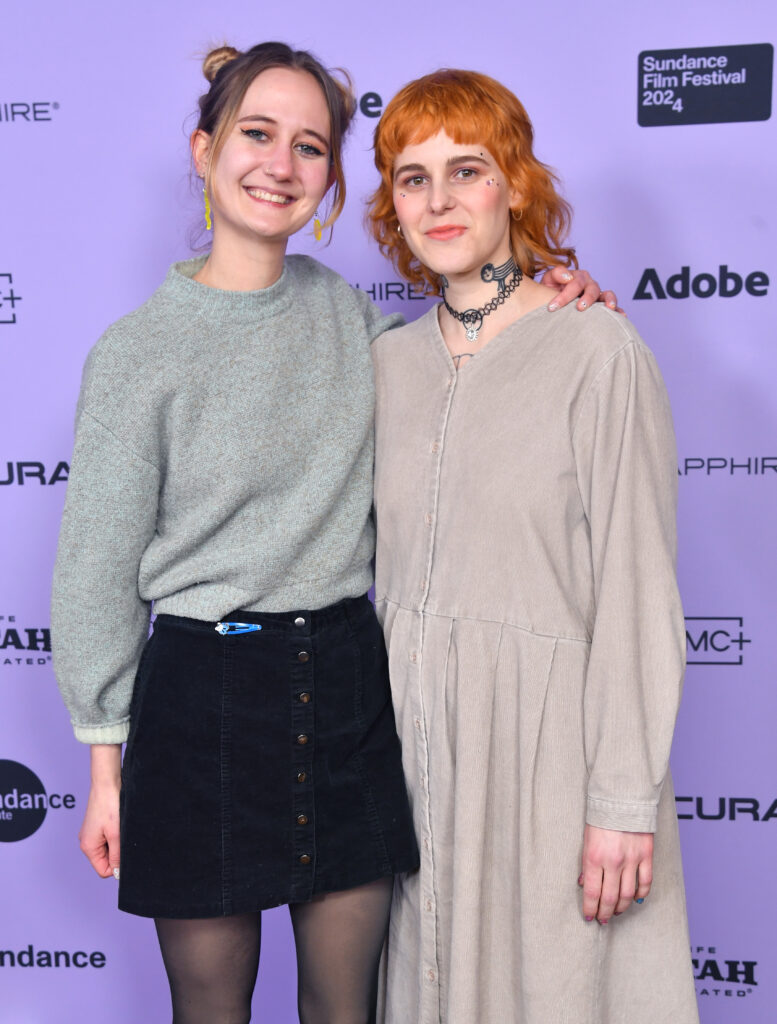
(L–R) Co-directors Kerstin Zemp and Bianca Caderas attend the January 19 premiere of the Animated Short Film Program at the Egyptian Theatre in Park City, Utah. (Photo by Stephen Lovekin/Shutterstock for Sundance Film Festival
Tell us why and how you got into filmmaking.
Sears: “When I was 11, I saw the behind-the-scenes of The Matrix and The Lord of the Rings on TV. I have never seen such a fun and interesting atmosphere in my life. And I really couldn’t believe that outcome came from that process. And I began to make movies to see if it really can be done in my life.”
Caderas: “I got a DVD with Japanese animation short films, and I saw Futon by Yoriko Mizushiri. Her animations are so soft and organic, and I love the color palette she uses. After I saw this, I knew I wanted to study animation, and I started watching a lot of films (fiction, short, experimental…). Now it’s my biggest passion.”
Zemp: “I got into animation through my love for film and illustration, and it just naturally seemed the logical combination. To be totally free to create whatever I could imagine and then also bring it to life is one of the best things I know.”
Rich: “I started out as an actor in comedy, and I had the very common experience of feeling like if I wanted good roles, I’d have to create them myself. So I started making stuff that I could be in.”
Soumeli: “It was a love that grew in the dark and stayed in the dark for many years until I could no longer resist. I remember watching films fanatically since I was a teen. I grew up in Agrinio, which, even though it is a relatively small town in western Greece, had at least five cinema theaters plus an art house film club. An old schoolmate of mine told me recently that when they used to ask me what I wanted to do after school, I would say that I wanted to be a director. This I don’t remember. I guess I had pushed it away, until 2016, when I finally left my job as a social researcher to get into writing and filmmaking.”
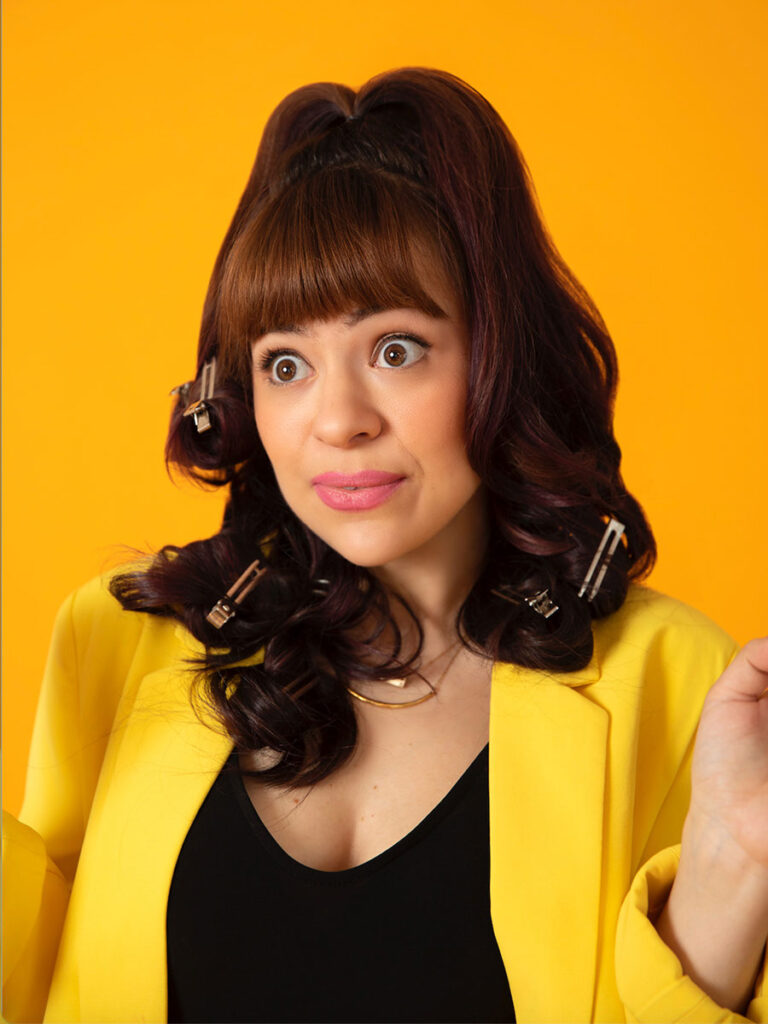
Alison Rich, writer-director of “Pathological”
Why is filmmaking important to you? Why is it important to the world?
Baumgartner: “If there is something like Neverland in this world, it is cinema. Watching movies has always been an escape for me. In a world where everything is so self-focused, I’m infinitely happy to be able to immerse myself in other worlds, create characters, and not constantly revolve around myself. There have been movies that have changed my entire life. My Own Private Idaho, for example. It crossed so many boundaries in my mind.”
Caderas: “For me, there is no other medium that is as all-encompassing as film. You sit in a dark room and are exposed to the moving image, with sound coming from left and right and everywhere — this immediately casts a spell over me and awakens emotions in me that would otherwise not be possible.”
Zemp: “I am a huge storyteller — I love creating things outside of our reality but then combining it with something we all struggle with or can relate to in one way or another.”
Soumeli: “As a new filmmaker, there is a strong political and social dimension that drives me, drawing on my longtime experience with people, women mostly, who exist in the margins of society. What I am trying to do with my stories is to shed light on those real people in fiction, in a way not only to make them visible but to truly embody them. As any form of art, cinema adds magic in our life, but it can also change us in ways to become better people.”
Archange and Perreard: “It’s a great way of expression. A vector of emotion and communication. You can be instantly in another culture, another country, another way of seeing things when you walk into a theater. You can experience things that you could never experience in your life because you get the chance to see through someone else’s eyes.”
One thing people don’t know about me is _______.
Soumeli: “I can never remember the names of the fingers. I don’t know my pinky from my thumb!”
Archange: “Ghost stories bring tears to my eyes. Maybe because the second thing people don’t know about me is that I am afraid of the dark.”
Perreard: “I love ghosts.”
Early bird or night owl?
Baumgartner: “I function best when everyone else is sleeping. Born night owl.”
Caderas: “Something in between”
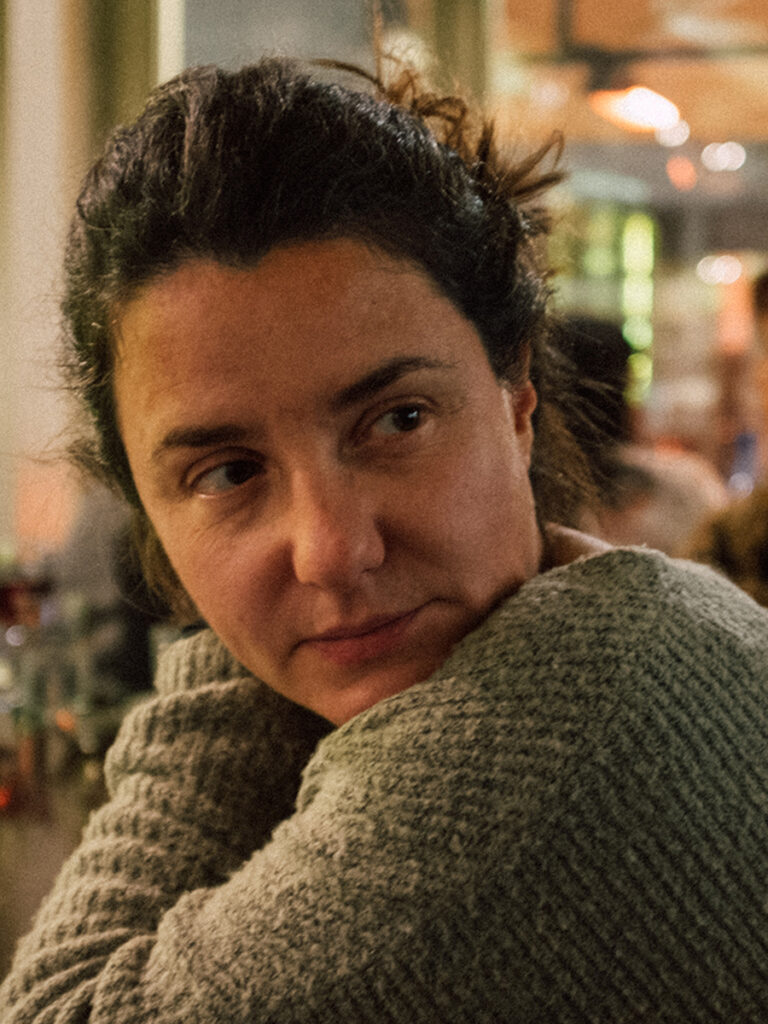
Vaggelio Soumeli, writer-director of “Phoebe”
Soumeli: “Definitely not an early bird, but I try to balance the night owl in me. Either way, it’s magical to see the sunrise.”
Archange: “More of a night owl than an early bird, but, to be honest, I am afraid of the dark, so neither.”
What three things do you always have in your refrigerator?
Baumgartner: “Milk, gel eye pads, and Kinder Milch-Schnitte”
Sears: “Water, hot pepper, cheese”
Caderas: “Oat milk, tofu, and nail polish”
Zemp: “Homemade jam, lemon juice, and an old jar of capers”
Rich: “Yogurt, ice cream, Spindrift”
Soumeli: “Moldy homemade jam, eggs, and goat cheese”
Archange: “Nothing, my fridge is empty most of the time.”
Perreard: “Cheese, cheese, cheese”